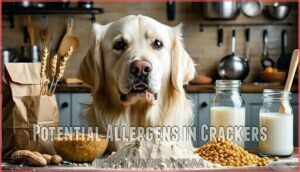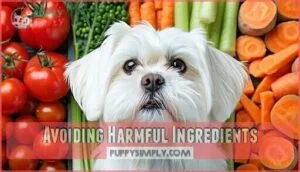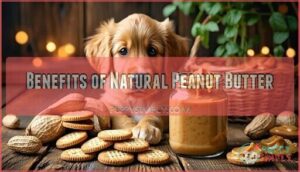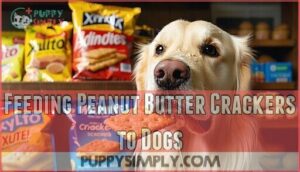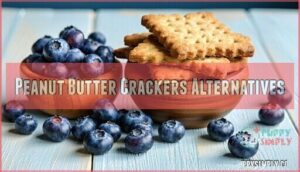This site is supported by our readers. We may earn a commission, at no cost to you, if you purchase through links.

The biggest danger is xylitol, an artificial sweetener that’s toxic to dogs and can cause serious health problems.
Most peanut butter crackers contain high sodium levels and preservatives that aren’t great for your pup’s health. While peanut butter provides protein and healthy fats, commercial crackers add unnecessary calories without much nutritional value.
If you want to share this treat, choose brands with natural ingredients and limit portions to tiny amounts. Plain peanut butter makes a safer alternative for occasional treats.
There are better ways to spoil your furry friend safely.
Table Of Contents
- Key Takeaways
- Peanut Butter Crackers Safety
- Can Dogs Eat Peanut Butter Crackers
- Health Benefits of Peanut Butter
- Peanut Butter Crackers Ingredients
- Homemade Peanut Butter Treats
- Feeding Peanut Butter Crackers to Dogs
- Peanut Butter Crackers Alternatives
- Consulting a Veterinarian
- Frequently Asked Questions (FAQs)
- Can dogs eat Peanut butter and cheese crackers?
- Can dogs eat crackers and Peanut butter?
- Can dogs eat Austin Peanut Butter crackers?
- How much peanut butter crackers per day?
- What age can puppies eat peanut butter?
- Do peanut butter crackers cause diarrhea?
- Can diabetic dogs eat peanut butter?
- Are saltine crackers with peanut butter safe?
- Conclusion
Key Takeaways
- Check for xylitol first – This artificial sweetener is toxic to dogs and can cause fatal liver failure and hypoglycemia within hours, so you must read ingredient labels carefully before sharing any peanut butter product.
- Limit portions to tiny amounts – Even safe peanut butter crackers are high in calories, sodium, and fat, which can lead to obesity, digestive upset, and pancreatitis if you feed them regularly or in large quantities.
- Choose natural peanut butter alternatives – Plain, xylitol-free peanut butter makes a safer treat than processed crackers, or you can make homemade dog treats where you control every ingredient.
- Watch for allergic reactions – Monitor your dog for signs of food allergies like itching, swelling, vomiting, or diarrhea when introducing any new treat, and stop feeding immediately if symptoms appear.
Peanut Butter Crackers Safety
When your dog eyes those peanut butter crackers, you’re right to wonder if they’re safe to share.
The answer isn’t straightforward because while peanut butter can be healthy for dogs, commercial crackers often contain ingredients that could harm your furry friend.
Risks of Xylitol in Peanut Butter
Some peanut butter brands contain xylitol, a deadly artificial sweetener that can kill your dog within hours.
Xylitol in peanut butter can be fatal to dogs within hours – always check labels first.
This toxic ingredient causes severe hypoglycemia and liver failure, making even small amounts dangerous. Understanding xylitol toxicity helps protect your pet from this hidden threat. Knowing which brands contain it’s essential, as xylitol is often hidden in peanut butter.
- Xylitol Toxicity strikes within 30 minutes, causing blood sugar to plummet dangerously low
- Liver Failure can develop in 12-48 hours, potentially causing fatal complications
- Hypoglycemia Risk leads to seizures, collapse, and coma without immediate action
- Seizure Potential increases rapidly as xylitol poisoning progresses through your dog’s system
Importance of Checking Ingredient Labels
Always check ingredient labels before giving peanut butter crackers to dogs — it’s your first line of defense against harmful additives and xylitol dangers.
Many commercial brands hide toxic ingredients that can seriously harm your pet.
| Ingredient to Avoid | Why It’s Dangerous |
|---|---|
| Xylitol | Causes liver failure and hypoglycemia |
| Hidden Sugars | Leads to obesity and dental problems |
| High Sodium Content | Can cause sodium poisoning |
| Garlic/Onion Powder | Toxic even in small amounts |
| Artificial Preservatives | May cause digestive upset |
Reading labels helps you spot these red flags and make safer choices for your dog’s health.
Dangers of Overconsumption
Too many peanut butter crackers can spell trouble for your furry friend.
Obesity risks skyrocket when dogs consume high-calorie treats regularly.
Pancreatitis danger increases due to excessive fat content, while digestive issues like vomiting and diarrhea become common.
Watch for allergy symptoms including itching and swelling.
Sodium poisoning poses serious threats, making moderation essential for dog safety.
Can Dogs Eat Peanut Butter Crackers
Your dog’s eyes might light up when you’re munching on peanut butter crackers, but hold that thought before sharing. The short answer is that dogs eat peanut butter crackers isn’t always safe territory. While peanut butter crackers dogs can technically consume won’t immediately harm them, are peanut butter crackers safe for dogs depends on several factors that make this snack tricky.
Dog safety requires checking these key points:
- Cracker Nutritional Value – High sodium and sugar content can stress your pup’s system
- Breed Specific Concerns – Smaller dogs face higher risks from the same portion sizes
- Digestive Enzyme Impact – Wheat and processed ingredients may upset sensitive stomachs
- Long-Term Effects – Regular consumption can lead to obesity and health complications
Commercial peanut butter crackers often contain preservatives and additives that aren’t dog-friendly. Remember to check for xylitol poisoning risks in the peanut butter filling. Cracker Recipe Alternatives made at home offer better control over ingredients, but moderation remains key for any treat.
Health Benefits of Peanut Butter
You’ll be happy to know that peanut butter offers several nutritional benefits for dogs when given safely.
This creamy treat contains essential vitamins B and E, quality protein, and healthy fats that support your dog’s overall health and energy levels, and it is also a good source of vitamins.
Vitamins and Minerals in Peanut Butter
Your dog’s snacking habits deserve careful consideration regarding peanut butter’s nutritional profile.
This creamy spread packs impressive Vitamin B Benefits, supporting brain function and energy metabolism. Vitamin E Support strengthens immune systems, while Niacin Effects promote healthy circulation.
These Mineral Sources contribute to overall wellness, making peanut butter a surprisingly nutritious addition to dog dietary needs when used properly.
However, be mindful of the high calorie content, which can lead to weight gain if overfed.
Protein and Healthy Fats in Peanut Butter
Beyond vitamins, peanut butter packs a protein punch that supports muscle development in your furry friend.
This protein acts as an energy source, helping active dogs maintain their stamina during playtime.
The healthy fats in peanut butter aren’t just heart-healthy—they’re your dog’s secret weapon for maintaining gorgeous skin and a shiny coat.
Key peanut butter benefits for dogs:
- Muscle Development – High-quality protein builds and maintains lean muscle mass
- Energy Source – Sustained energy for active dogs throughout the day
- Skin Health – Omega-3 fatty acids reduce inflammation and dryness
- Coat Health – Natural oils promote shine and reduce shedding
- Heart Health – Monounsaturated fats support cardiovascular function
Brain Function and Cell Health
Vitamin B in peanut butter works like fuel for your dog’s brain, supporting cognitive function and cell regeneration throughout their body.
This essential nutrient helps maintain neurological health while providing antioxidant effects that protect against cellular damage.
When you’re considering dog nutrition advice, remember that Vitamin B benefits extend beyond basic pet health – it’s essential for mental sharpness and overall vitality in your furry friend.
Peanut Butter Crackers Ingredients
When you’re checking if peanut butter crackers are safe for your dog, you need to look closely at what’s actually in them.
Most commercial crackers contain ingredients that can harm your furry friend, from hidden sweeteners to high sodium levels that weren’t made with dogs in mind.
Analyzing Calories and Nutrients
Standard peanut butter crackers pack around 190 calories per serving, with high calorie content that can quickly add up for dogs.
The macronutrient ratios show 50% fat and 40% carbohydrates, creating nutritional deficiencies since they lack essential vitamins.
Most ingredient sourcing focuses on processed wheat and oils rather than whole foods, which doesn’t support a balanced diet for proper dog nutrition and health.
Potential Allergens in Crackers
Common ingredients in crackers can trigger allergic reactions in sensitive dogs.
You’ll want to check labels carefully since many commercial crackers contain problematic ingredients that could cause digestive upset or more serious health issues.
- Wheat Allergies – Enriched flour contains gluten that can cause skin irritation and stomach problems in sensitive dogs
- Dairy Sensitivities – Some crackers include milk powder or cheese that may trigger lactose intolerance symptoms
- Soy Concerns – Soybean oil is a common ingredient that can cause allergic reactions in dogs with soy sensitivities
- Additive Reactions – Artificial preservatives and flavor enhancers may cause digestive upset or skin irritation in prone dogs
Harmful Additives in Commercial Crackers
Commercial peanut butter crackers contain numerous toxic preservatives like BHA and BHT, which are linked to cancer risks.
These harmful dyes, artificial flavors, and excessive sodium create serious dog health risks.
Hidden sugars and xylitol make these toxic ingredients particularly dangerous for your pet’s safety.
| Harmful Additive | Health Risk | Common Sources |
|---|---|---|
| Toxic Preservatives | Cancer, liver damage | BHA, BHT, Ethoxyquin |
| Artificial Flavors | Allergic reactions, digestive upset | Propylene glycol, synthetic compounds |
| Harmful Dyes | Behavioral changes, potential toxicity | Red 40, Yellow 6, Blue 2 |
| Excessive Sodium | Salt poisoning, kidney disease | Table salt, sodium compounds |
| Hidden Sugars | Obesity, diabetes, dental issues | High fructose corn syrup, sucrose |
Homemade Peanut Butter Treats
Making your own peanut butter treats gives you complete control over what goes into your dog’s snacks.
You can skip the harmful additives like xylitol and excess salt that make store-bought options risky for your pet.
Making Healthy Peanut Butter at Home
Making your own peanut butter at home gives you complete control over homemade ingredients, ensuring your dog treats recipes stay safe.
Simply grind roasted, unsalted peanuts in a food processor for 5-10 minutes until creamy. Skip safe additives like oils or sugars – natural peanut oils provide smoothness.
Consider purchasing chewy peanut products for added texture. Store using proper storage methods in airtight containers.
Recipe variations can include different peanut types, but always check what dogs eat peanut butter crackers should contain.
Avoiding Harmful Ingredients
You can’t just throw any peanut butter into homemade treats without checking what’s lurking inside.
Reading labels isn’t just smart—it’s vital for keeping your furry friend safe from toxic foods for dogs.
Key ingredients to avoid in peanut butter crackers:
- Xylitol – This artificial sweetener causes dangerous blood sugar drops
- Excessive salt content – Can lead to sodium poisoning in dogs
- Harmful additives and preservatives – May trigger digestive upset or allergic reactions
When making homemade dog treats, stick to natural peanut butter with peanuts as the only ingredient.
Skip brands loaded with sugar levels that spike calories unnecessarily.
Your dog’s health depends on understanding xylitol dangers and other preservatives risks.
Simple, clean ingredients protect against dog food safety issues while guaranteeing your pup enjoys every bite without worry.
To guarantee treats are nutritious, consider vet approved recipes.
Benefits of Natural Peanut Butter
Natural peanut butter offers your dog pure nutritional benefits without harmful additives.
When you choose brands with only peanuts, you’re providing essential vitamins and healthy fats that support overall wellness.
| Benefit | Natural Peanut Butter | Commercial Varieties |
|---|---|---|
| Digestive Health | Pure ingredients, easier processing | May contain additives causing upset |
| Skin Health | Natural oils for coat shine | Artificial preservatives can irritate |
| Muscle Support | Clean protein for development | Added sugars reduce protein quality |
| Energy Source | Sustained energy from healthy fats | Sugar spikes from artificial sweeteners |
Can dogs have peanut butter? Yes, but natural varieties provide the best immune boost for pet health.
These dog treats deliver muscle support and energy without the risks found in processed options, making them ideal for maintaining your dog’s health naturally.
Feeding Peanut Butter Crackers to Dogs
When you’re considering peanut butter crackers for your dog, you’ll need to carefully evaluate both the peanut butter and cracker ingredients to verify they’re safe.
Most commercial peanut butter crackers contain additives, excess sodium, and potentially harmful ingredients like xylitol that can pose serious health risks to your furry friend.
Portion Control and Moderation
When you’re sharing peanut butter crackers with your furry friend, think of treats as the cherry on top of their daily meal plan.
Dog treats shouldn’t exceed 10% of their daily intake to maintain proper weight management.
Here’s your portion control checklist:
- Tiny tastes only – A small piece equals one treat serving
- Count calories carefully – Track treat frequency against daily limits
- Size matters – Adjust serving sizes based on your dog’s weight
- Less is more – Practice dog moderation with all dog snacks
- Watch the waistline – Monitor for healthy weight management.
Smart portion control keeps your pup healthy and happy while enjoying occasional dog treats safely.
Monitoring for Allergies and Digestive Issues
Always watch for allergy symptoms like itching, swelling, or difficulty breathing when introducing peanut butter crackers.
Monitor reactions closely during gradual introduction, as some dogs develop digestive upset from new foods.
Check for xylitol on labels since it’s toxic. If you notice allergic reactions or digestive issues, stop feeding immediately and consider vet consultation for dog allergies or digestive health concerns.
Choosing Natural and Healthy Ingredients
When selecting dog treats, you’ll want to read labels carefully.
Look for natural ingredients without artificial preservatives or sweeteners.
Organic options offer cleaner ingredient sourcing for your pet’s health.
Homemade benefits include controlling what goes into healthy dog treats.
You can even find a variety of chewy dog treats online.
Avoiding additives like xylitol protects your dog from harm.
Safe alternatives to commercial products give you peace of mind about ingredients affecting dog health.
Peanut Butter Crackers Alternatives
If you’re looking for safer alternatives to peanut butter crackers, plenty of dog-friendly options exist that won’t put your pet at risk.
Fresh fruits like apple slices and blueberries make excellent treats, while homemade dog biscuits let you control every ingredient that goes into your pup’s snack, providing a safer option.
Healthy Snack Options for Dogs
Your dog’s snack options don’t have to be boring or store-bought.
DIY dog treats using simple ingredients like peanut butter and oats create healthy dog treats that beat commercial options.
Safe snacks for dogs include grain-free snacks, limited ingredient treats, and dental chew options that support dog health while keeping tails wagging.
For a convenient option, consider Zuke’s Mini Naturals, which are made with real chicken and offer a healthy alternative.
Fruits and Vegetables as Treats
When looking for safe snacks for dogs, natural fruits and vegetables make excellent alternatives to processed treats.
These wholesome options provide essential nutrients while keeping your furry friend happy and healthy.
- Safe Vegetables: Carrots, green beans, and sweet potatoes offer fiber and vitamins with satisfying crunch
- Healthy Fruits: Blueberries, apple slices, and banana chunks deliver antioxidants and natural sweetness
- Portion Sizes: Small pieces prevent choking while controlling calories for ideal weight management
Remember proper preparation methods—remove seeds, cores, and stems before serving. Monitor for allergy concerns when introducing new dogfriendly snacks.
Homemade Dog Treats Recipes
Making your own treats beats store-bought options every time. You’ll control every ingredient and avoid harmful additives that sneak into commercial products.
You can even purchase chewy treat supplies to make the process easier.
| Recipe Type | Key Ingredients | Prep Time |
|---|---|---|
| DIY Dog Biscuits | Oat flour, peanut butter, eggs | 30 minutes |
| Grain-Free Recipes | Coconut flour, sweet potato | 25 minutes |
| Allergy-Friendly Treats | Rice flour, pumpkin puree | 20 minutes |
These homemade dog treats recipes let you customize based on your pup’s needs.
Vegan Dog Treats work great using banana and oat combinations. Simple Baking Substitutions like applesauce for eggs make natural dog snacks recipes accessible for everyone.
Consulting a Veterinarian
Regarding your dog’s diet and treats like peanut butter crackers, your vet is your best resource for personalized advice.
They can assess your dog’s specific health needs, allergies, and dietary restrictions to help you make safe choices that won’t harm your furry friend, with the goal of providing the best possible care for your dog.
Importance of Professional Advice
Your pet’s health deserves professional guidance, especially when introducing new foods.
Vet consultation helps identify breed specifics and health conditions that affect dietary choices.
Veterinarians provide personalized nutrition advice based on your dog’s unique needs.
They’ll share essential dog health tips and pet safety recommendations.
Regular check-ups can help with early issue detection.
Professional pet health advice guarantees dietary changes support your dog’s wellbeing rather than harm it, ensuring a healthy lifestyle.
When to Consult a Vet About Diet
Call your veterinarian when you notice dietary changes affecting your dog’s behavior or health.
Weight concerns, allergic reactions, or underlying conditions require professional guidance. If your dog shows signs of food allergies or you’re considering xylitol-free treats, seek expert advice.
Nutritional deficiencies can develop quickly, so don’t wait when something seems off with your pup’s eating habits, as this may indicate a need for expert advice.
Creating a Balanced Diet for Dogs
Your veterinarian’s expertise becomes invaluable when designing your dog’s nutritional blueprint.
They’ll calculate precise caloric needs based on your pup’s breed specifics, age, and activity level.
Professional guidance guarantees proper nutrient ratios in dog food selections, addresses hydration importance, and determines when supplement use benefits your canine diet.
This personalized approach creates a truly balanced diet supporting peak health.
Frequently Asked Questions (FAQs)
Can dogs eat Peanut butter and cheese crackers?
Walking a tightrope between treat and trouble, cheese peanut butter crackers aren’t your dog’s best friend.
They’re packed with sodium, sugar, and potential toxins like xylitol that’ll upset your pup’s stomach or worse.
Can dogs eat crackers and Peanut butter?
Dogs can eat crackers and peanut butter occasionally, but you’ll want to check ingredients carefully.
Avoid crackers with xylitol, excess salt, or garlic powder—these are toxic to dogs and can cause serious health problems.
Can dogs eat Austin Peanut Butter crackers?
Like a parent protecting their child from hidden dangers, you shouldn’t give Austin Peanut Butter crackers to your dog.
These processed snacks contain harmful ingredients like xylitol, excess sodium, and preservatives that can cause serious health problems including toxicity and digestive upset, which is a significant concern for dog owners.
How much peanut butter crackers per day?
You shouldn’t give your dog peanut butter crackers daily.
These processed snacks contain harmful ingredients like excess sodium, sugar, and potentially toxic additives that can cause serious health problems with regular consumption.
They can lead to serious health problems due to the regular consumption of these snacks.
What age can puppies eat peanut butter?
While tiny puppies can’t handle rich treats, you can introduce plain, xylitol-free peanut butter to healthy puppies around 8-10 weeks old in very small amounts as occasional treats.
Do peanut butter crackers cause diarrhea?
Yes, peanut butter crackers can cause diarrhea in dogs.
The high fat content, sodium, and artificial additives often trigger digestive upset.
Your dog’s sensitive stomach isn’t built for processed human snacks with excess salt and sugar, which can lead to diarrhea.
Can diabetic dogs eat peanut butter?
Diabetic dogs shouldn’t eat peanut butter due to its high sugar and fat content, which can worsen blood sugar control and lead to dangerous spikes or complications.
Are saltine crackers with peanut butter safe?
Saltine crackers with peanut butter aren’t recommended for dogs.
They’re high in sodium and may contain harmful additives.
The peanut butter must be xylitol-free, but even then, it’s better to choose dog-specific treats instead.
Conclusion
Sarah’s golden retriever once snatched a sleeve of crackers from the coffee table, leading to a panicked vet visit.
While can dogs eat peanut butter crackers isn’t a simple yes or no, the answer depends on ingredients and quantity.
Check labels for xylitol, which is toxic to dogs. Choose natural brands without artificial sweeteners or excessive sodium.
Small amounts occasionally won’t harm most dogs, but plain peanut butter makes a safer choice.
When in doubt, consult your veterinarian for personalized advice.



